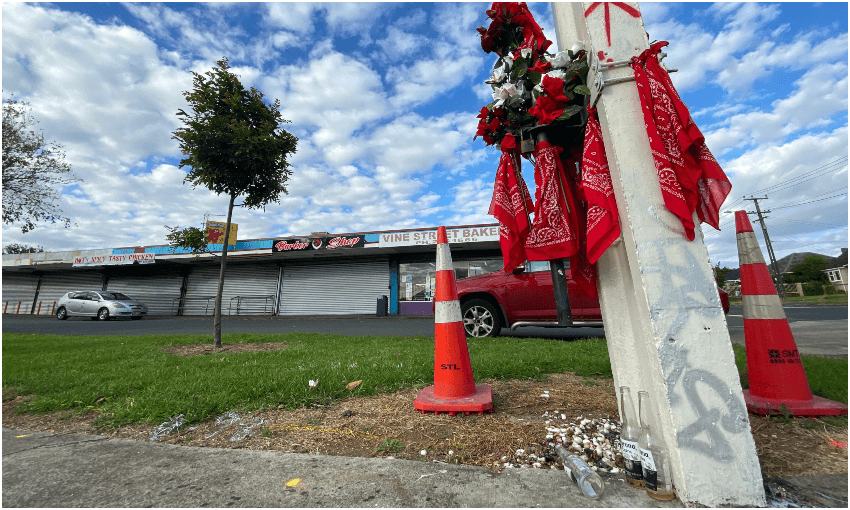Frustrated at the spread of liquor stores across South Auckland, local advocacy groups and health officials say an urgent review of licensing laws is needed – and are asking questions about a licensing commissioner with historic ties to the alcohol industry.
Three bottles of Corona beer, still containing some meagre dregs, sit at the foot of a power pole beneath a collection of red bandanas on Mangere East’s Vine St, a short distance from Middlemore hospital. The items serve as a memorial to 26-year-old Arthur Brown, who was shot outside these shops in the early hours of March 10, 2019.
As I photograph the memorial, it strikes me how important Brown must have been to his friends and family, given that two years since his death they are still gathering to toast a brother and a mate.
The presence of recently drained glass bottles, however, points to another issue. The grievers would have had eight outlets within a 2km radius from which to purchase this Mexican-brewed pale lager. And in the future, they may only need to walk a few metres, because despite the existing abundance of choice, a new liquor store might be opening next to Vine St’s 24/7 laundromat.
Just over a kilometre away, on Wickman Way, is a Thirsty Liquor store. Its licence renewal application has just been approved, despite objections from the police, public health professionals, a high school principal and a number of local residents.
Shirl’e Fruean lives halfway between Wickman Way and Vine St and was attending a protest outside the proposed store when we spoke on March 16. “There’s been a murder and a suicide in the park here. You see people walking around the neighbourhood drinking and we get teenagers waiting outside stores, asking adults to buy alcohol for them so the last thing we want is to see more drunk people around our community.”
A performing arts tutor and accomplished musician, Fruean says she’s worried that the proliferation of liquor stores communicates an unhealthy message to the youth she works with, as well as to her own young children. “I don’t want them to think alcohol is the main thing in Māngere but with so many stores here, unfortunately it shows that’s all we’re about – even though we’re not.”
And her concerns are backed by research. Auckland Regional Public Health Service’s (ARPHS) medical officer of health Nick Eichler says international and New Zealand evidence is clear that more liquor stores means more people being harmed by alcohol. And according to ARPHS’ analysis, South Auckland has a much higher density of off-license outlets than in other parts of the city.
“The bottle stores don’t steal business from each other, rather they create new business as they induce more drinking and more hazardous drinking,” says Eichler. “If you compare different areas in New Zealand with similar levels of deprivation and similar ethnicity profiles, and just look at how many bottle stores there are, and you will see lower rates of harm in those areas [with fewer stores].”
Community calls for DLC commissioner to step down
For the last seven years Communities Against Alcohol Harm (CAAH) has been fighting against the opening of liquor stores in South Auckland. But their success rate is relatively low, despite having help from a barrister with expertise in local government law.
When it was revealed that one of the District Licensing Committee (DLC) commissioners, Katia Fraser, had previously represented alcohol business clients as a lawyer while at the same time working as a Licensing Committee commissioner, CAAH members were shocked. CAAH member Reverend Emily Worman says her organisation is deeply concerned that Auckland Council not only reappointed Fraser to the DLC, but promoted her to chief commissioner, a role which requires her to oversee the 11 other DLC panelists.
“We’ve been fighting in this space for years and it’s exhausting,” says Worman. “Seeing Katia Fraser being appointed as the chief DLC commissioner is just another example of how this system works against our community and our very real concerns.”
Worman says she is particularly concerned about the decision from the DLC, chaired by Fraser, on the Thirsty Liquor Wickman Way store. “Just last year we had 159 local people object to a liquor store which sits opposite two large schools and yet that licence was renewed.”
It’s not only locals who are raising concerns. In a 2019 letter to Auckland Council, Auckland Regional Public Health Service director Dr William Rainger asked that Fraser’s appointment to the DLC be “revoked”. The letter stated: “Ms Fraser’s involvement with the alcohol industry … is such that she cannot perform her duties as a Commissioner without at least the appearance of bias.”
Along with Rainger’s letter to council, three other letters were sent, from CAAH, Māori warden David Ratu and the Ōtara Gambling and Alcohol Action Group, all expressing concern about the risk of a conflict of interest.
Section 193 of the Supply and Sale Alcohol Act says a person must not be appointed to a commissioner role if, due to their involvement with the alcohol industry, they can’t perform their duties “without actual bias or the appearance of bias”. Eichler says that is the basis on which ARPHS complained about Fraser.
“We had concerns she was acting as a legal advisor to alcohol industry clients, in other areas of the country, while also being a district licensing commissioner here,” he says.
“I think it would be reasonable for someone to think there was some kind of conflict of interest for acting on both sides of the aisle.”
‘We were not shown those letters’
Auckland councillor Josephine Bartley was in charge of selecting the DLC commissioners for a new three year term beginning in 2020. She says council officers never showed her the letters during the selection process, but that Fraser was one of the few lawyers who applied for a role, making her a particularly strong candidate.
“We were not shown those letters and maybe that would have changed our minds,” she says.
“There’s a whole selection process that is quite robust and thorough and I was satisfied with Katia’s explanation that she did not have any interests that would stop her from being on the DLC. For the chief commissioner role, that required specific legal expertise and experience and that is what we had to consider.”
Fraser declined to comment when contacted for this story, instead referring inquiries to Auckland Council.
In a statement, Kenneth Aiolupotea, the council’s general manager for democracy and engagement, said: “The council was careful to ensure that its selection process was fair and robust to all candidates and that all candidates were treated the same way. If a complaint or concern had been raised about a candidate but had been fully investigated and concluded to the council’s satisfaction, no information regarding that complaint or concern was provided to the selection panel. However, all candidates were thoroughly questioned around conflicts of interest, both actual or perceived at the commencement of each interview.”
A system-wide issue
Bartley argues that the Sale and Supply of Alcohol Act, passed by the National government in 2012, is the real problem.
“The legislation isn’t strong enough to enable the DLC to prioritise the reduction of community harm. At the moment, the current legislation doesn’t give them much to go off and until you have a local alcohol plan [currently being appealed by two supermarket businesses], you can’t get much traction.”
Eichler agrees. ARPHS’s concerns go beyond “who’s on the committee to the way the whole system works”, he says.
“There’s been an incredible amount of work by lots of good people at Auckland Council, communities, the police and ourselves to develop the local alcohol plan and Auckland Council should have the autonomy to put it through, but the act doesn’t protect it from the alcohol industry tying it up in endless appeals, which is where it still sits.”
He says the judicial nature of the DLC hearings also disadvantages local residents who want to raise concerns.
“This is huge money for the alcohol industry so spending a lot of money on hiring top tier lawyers to cross-examine community objectors in the DLC is pocket change for them. And that really prevents communities feeling empowered to speak to these proceedings.”
Now change might be on the horizon. Justice minister Kris Faafoi recently announced a review of the law is being considered, though its timing and scope is yet to be determined.
For Worman and the other members of Communities Against Alcohol Harm, the review can’t come fast enough. She says it’s infuriating that decision makers seem indifferent to what alcohol is doing to already disadvantaged places like Māngere.
“We see for ourselves what all the reports and research tell us – more access to alcohol means more harm. The community simply wants a genuine stake in this process. So why are we being ignored?”



